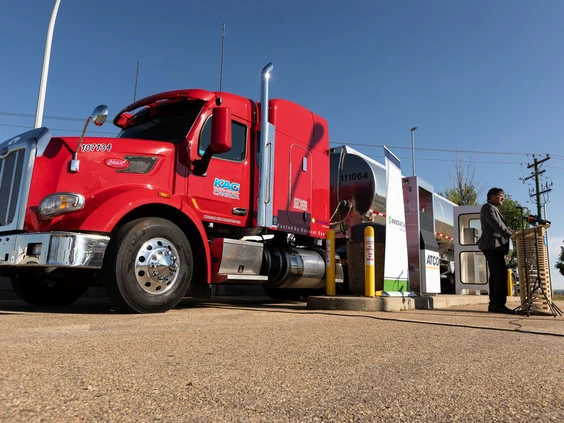Most Canadians don’t give much thought to how their goods get to them. Between raising their families and going to work, they just want to find what they need when they need it. Seemingly overnight, however, all that has changed. The global supply chain crisis is affecting the availability of goods and driving up prices, something that will likely continue for months to come, if not longer. And the situation continues to evolve by the day.
If you want to get a sense of the scale of the problem, just look at the images of dozens of cargo ships idling off the coast of Los Angeles or Vancouver, many carrying the equivalent of a 70-kilometre freight train in shipping containers. Now imagine the same thing happening at ports around the world.
Unfortunately for Canadians, this crisis is compounded by a challenge at home — a commercial driver shortage. Across the country, bus and truck companies are struggling to fill vacancies, and this is on top of the imminent wave of retirements the industry is facing.
According to a 2019 Statistics Canada report based on 2016 data, 31 per cent of male transport truck drivers were at least 55 years old compared to just 22 per cent of the total employed population across all occupations. To keep up with current demand alone, Canada needs more than 17,200 new truck drivers every year up until 2025. That’s not easy.
Fifty-two per cent of Alberta’s GDP is delivered on the back of a truck, and one in four Albertans rides a bus in their daily travels. It’s imperative this is treated as a priority, and now. To keep goods and people moving across the country, we need more men and women behind the wheel.
In Canada, only three per cent of truck drivers are women. South of the border, 10 per cent of truck drivers are women, up from 7.8 per cent just three years ago. Women are an untapped and obvious pool to fill these roles.
Here in Alberta, an organization called Women Building Futures is helping to increase the number of women drivers with a program that covers essential safety certifications and the hands-on training needed to support and prepare students to successfully obtain a Class 1 licence and partners with reputable organizations who help fund the program to ease the job search process for successful candidates.
The trucking industry is also doing what it can, including offering competitive compensation, flexible work schedules, and employers committed to improving the perception of opportunities in our industry. There is only so much, however, we can do alone. We need to work with both the provincial and federal governments and industry partners to find ways of attracting new drivers to the industry, including new Canadians.
There is a unique opportunity to connect immigrants and trusted trucking companies so newcomers to Canada can start careers as professional drivers with safe, responsible, and labour-compliant fleets. Whether trucking or driving a bus or motorcoach, commercial transportation is an excellent way for new Canadians to provide for their families. We know that working with our government partners can help make this happen.
As a society, we also need to change perceptions about the industry so we can attract a new, young, and diverse workforce. Commercial transportation careers are an excellent opportunity for the thousands of Canadians currently looking for work.
They pay well without requiring years of schooling and tens of thousands of dollars in student loans. They provide job security in an economy that rarely does. And they offer the satisfaction of being a critical link in the supply chain, bringing much-needed service — moving goods and people across the country — while getting to enjoy the journey of the open road.
Our supply chain challenges can’t be fixed overnight, but with collaborative partners and solution-focused dialogue we can do it. Our trucking and bus industry is committed to safety, professionalism, and service. What we need now is government action to get Canada moving.
Jude Groves is the board chair of the Alberta Motor Transport Association, the province’s foremost organization devoted to advancing the commercial transport industry through safety programs, progressive policy, and partnerships.


